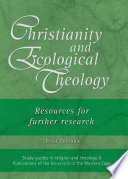-

Christian in Public
0R370,00Higher education has not escaped the imperative of transformation which has marked the post-apartheid South African landscape. The nature of the changes at universities, however, is open to critique. Fundamental questions concerning the ideological moorings of knowledge and the politics of the curriculum have not yet been satisfactorily addressed. During the apartheid era, theology faculties played influential roles at traditional universities, and were often characterised by unsettling exclusion of non- Christian religions, non-Calvinist denominations and marginalised voices. This volume of essays evidences a process at the University of the Free State’s Faculty of Theology to reflect seriously about the need for transformation at the fundamental level, that is, of knowledge. The challenge for theology at a public university is framed in terms of epistemological transformation. A number of outstanding public intellectuals such as Jonathan Jansen, Crain Soudien and Lis Lange have been invited to present papers to clarify the conceptual challenge and what this might entail for theology. Well-known theologians such as Conrad Wethmar, Allan Boesak and Martin Prozesky reflect on the nature of theology and religion at universities amidst social exigencies. Two international theologians ? Harold Attridge from the prestigious Yale Divinity School and Bram van de Beek from the Free University of Amsterdam ? share their experiences of institutions that exemplify excellence and ecumenical openness. Theologians from the Departments of Practical Theology and Systematic Theology at the University of the Free State, writing from the ‘inside,’ articulate the challenges they envision for theology in a post-apartheid dispensation. The essays represent a variety of perspectives, but all attest to a commitment to re-think the nature and task of theology at a public university, accepting the challenge of knowledge and power, of plurality and otherness, and of restorative intellectual justice. These timely essays make a unique contribution to the discourses on transformation and on theology at a public university.
-
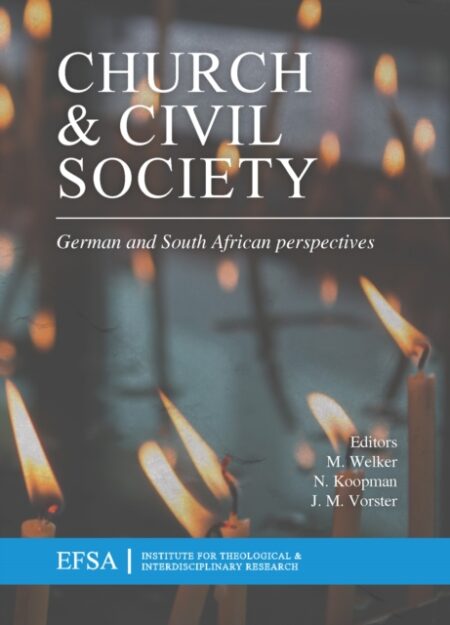
Church and Civil Society
0R490,00Germany and South Africa experienced drastic social transitions with the fall of the Berlin Wall in 1986 and the end of Apartheid in 1994. This book consists of a collection of essays from German and South African theologians who analyse the role that religious communities had, and are still playing within the respective civil societies. The concept and texture of civil society are analysed; case studies are presented; theological perspectives are given on the relation between church, state and civil society; and guidelines are provided for the healing role that Christian religious communities can play in Germany and South Africa. This book is mainly directed at theologians and scholars in religious studies, however, sociologists and political philosophers may also find the essays informative. Besides the wide variety of theological approaches; sociological and empirical data; and practical theological perspective, the book also yields interesting comparative analysis on two societies in transition.
eBook: View eBook Version
-

Church and Civil Society
0R0,00Germany and South Africa experienced drastic social transitions with the fall of the Berlin Wall in 1986 and the end of Apartheid in 1994. This book consists of a collection of essays from German and South African theologians who analyse the role that religious communities had, and are still playing within the respective civil societies. The concept and texture of civil society are analysed; case studies are presented; theological perspectives are given on the relation between church, state and civil society; and guidelines are provided for the healing role that Christian religious communities can play in Germany and South Africa. This book is mainly directed at theologians and scholars in religious studies, however, sociologists and political philosophers may also find the essays informative. Besides the wide variety of theological approaches; sociological and empirical data; and practical theological perspective, the book also yields interesting comparative analysis on two societies in transition.
Print: View Print Version
-

Church emerging from the cracks
0R225,00The drawing, Christ of the Breadlines, by Fritz Eichenberg (1953) probably says all that this book wants to say about being church. The church is a space in this world where heaven and earth reach out to each other. It is a space in the world, but not of the world, as it is touched by heaven. Christ is in the breadline, yet one can recognise Him as He stands out in the breadline. One can recognise him, because of the hallow that surrounds him. He is the incarnation within reality and through the incarnation the place within reality becomes holy, not sacred as in separated, but sanctified as differentiated offering an alternative within reality. He brings a space that is marked, not by the darkness and the vicious cycles of the world which dominate and enslave creation, such as poverty, but a space that breaks into this darkness with light as it is hallowed in hope. What more can the church hope for than to be allowed to be a space of hallowed hope in the vicious systems of death in a postmodern and post-Christian world? This book would like to propose that it does not really matter if you start with theory (Scripture and tradition) or with context and practice because theology is circular or spiral, and therefore there is no starting point as the two continually influences each other, or one could even say the one interprets the other. So for this book the best place to start is with where we are now ? the now of experience as this now of experience includes both theory and praxis.
There is no such thing as experience pure and simple, as experience is always interpreted-experience and the interpretation is done through the theory that has shaped and formed us. Thus, in this book we work with ?theory-laden practice?.
-
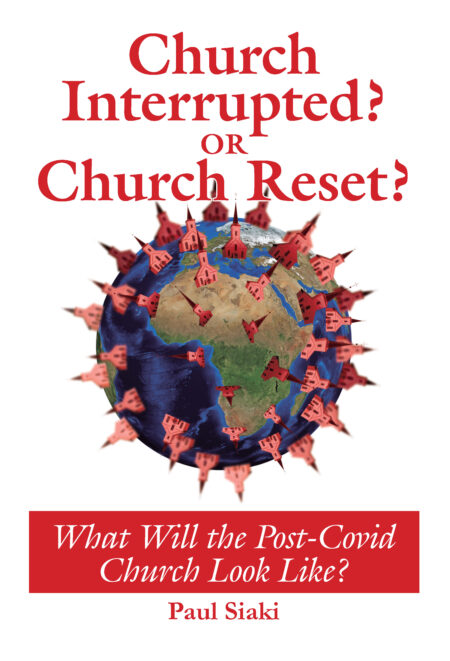
Church Interrupted? Or Church Reset?
0R200,00The whole world just got punched in the mouth. When does that ever happen? All of our plans are out the door and weOd be lucky to guess whatOs happening next year, let alone two to three years down the road.
Covid-19 was a world changer and every area of life was affected. Including the Church. The Church has had to make so many changes you canOt keep up with it.
So what comes next?
This book seeks to ask two life-changing questions: Has Church simply been Interrupted as we wait to return to life as usual? Or can this pandemic be an opportunity for the Church to Reset? We coin the term, the OGreat OpportunityO. Is this what weOve been given? Has a sovereign God decided itOs time for a shake-up and this is the time to do it?
Find out what went on during this time around the world. Find out how churches fared in the aftermath of past pandemics. Find out what things you can keep doing to get people back to church and what new (old) practices God wants us to be doing.
The World and the Church get shaken up every 100 years or so. In years to come, someone may ask, OWhere were you when the pandemic hit?O OWhat did you do?O OHow did your church handle it?O LetOs make it a great story.
-

Climate Change Remedies
0R340,00Climate change poses very serious risks to mankind. Adaptation and damages are emphasised more and more. Although adaptation is important, priority should be given to prevention (mitigation). The contributions in this volume emanate from an international research project that deals with a legal kaleidoscope of legal issues and focuses primarily on preventive remedies. The contributions of Spier and Magnus tackle injunctive relief and discuss the myriad of legal questions courts have to answer if they are willing to grant injunctive relief. This part of the book addresses procedural, private international and substantive law. Kemp’s contribution discusses the role criminal law could play to come to grips with the threats of climate change. So far, the greater part of the debate is about the United States, Europe and, increasingly, Asia. Ruppel fills this gap by painting an African perspective.
eBook: View eBook Version
-

Climate Change Remedies
0R0,00Climate change poses very serious risks to mankind. Adaptation and damages are emphasised more and more. Although adaptation is important, priority should be given to prevention (mitigation). The contributions in this volume emanate from an international research project that deals with a legal kaleidoscope of legal issues and focuses primarily on preventive remedies. The contributions of Spier and Magnus tackle injunctive relief and discuss the myriad of legal questions courts have to answer if they are willing to grant injunctive relief. This part of the book addresses procedural, private international and substantive law. Kemp’s contribution discusses the role criminal law could play to come to grips with the threats of climate change. So far, the greater part of the debate is about the United States, Europe and, increasingly, Asia. Ruppel fills this gap by painting an African perspective.
Print: View Print Version
-
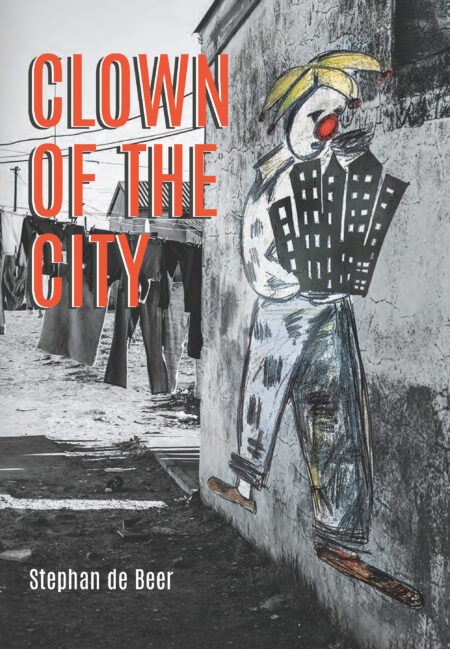
Clown of the City
0R345,00At opening this book, everything one has learned or thought about Ourban ministryO is challenged, and changed. Stephan de Beer offers a fresh, exciting and thoroughly engaging approach. The title is enticing and playful, but the book is a serious grappling with the daunting realities of a shadowed, marginalised, urban life. It does not theorise or pontificate about a concept. The author is not a distant, neutral observer. He is an engaged minister to the people, a struggler in their struggles, prophet to the powerful. This book invites the reader to join the people of the cities under siege by failed policies, empty promises, and disastrous politics, in their struggles for meaningful life, and it makes a powerful, persuasive case. Stephan de Beer has offered us a great gift and a wonderful opportunity to think and hope anew, and differently, about the life, reality, and future of the city.
eBook: View eBook Version
-

Clown of the City
0R275,00At opening this book, everything one has learned or thought about Ourban ministryO is challenged, and changed. Stephan de Beer offers a fresh, exciting and thoroughly engaging approach. The title is enticing and playful, but the book is a serious grappling with the daunting realities of a shadowed, marginalised, urban life. It does not theorise or pontificate about a concept. The author is not a distant, neutral observer. He is an engaged minister to the people, a struggler in their struggles, prophet to the powerful. This book invites the reader to join the people of the cities under siege by failed policies, empty promises, and disastrous politics, in their struggles for meaningful life, and it makes a powerful, persuasive case. Stephan de Beer has offered us a great gift and a wonderful opportunity to think and hope anew, and differently, about the life, reality, and future of the city.
Print: View Print Version
-
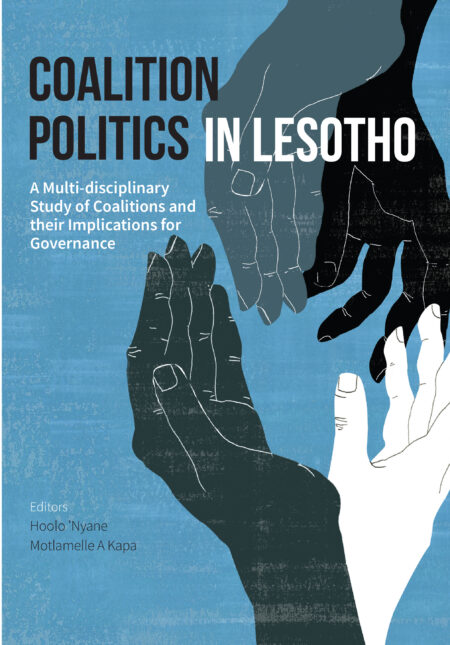
Coalition Politics in Lesotho
0R350,00Ever since independence from Britain in 1966, Lesotho has been an experimental laboratory of various governance models. The country has experienced multi-party models, plain dictatorships, one-party dominated models, military juntas and, recently, coalition governments. The advent of coalition politics since 2012 has brought a paradigmatic shift in the entire socio-political landscape in the country. This era has, hitherto, largely remained under-studied. Coalition Politics in Lesotho is the first book-long study specifically dedicated to this significant era in the countryOs history. Edited by the two leading politico-legal scholars on Lesotho, the book is a multi-disciplinary study of the implications of coalitions for governance and development.E
eBook: View eBook Version

